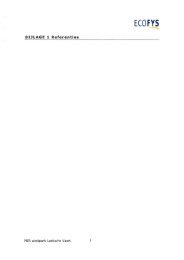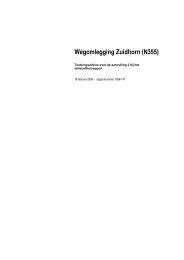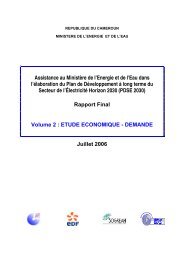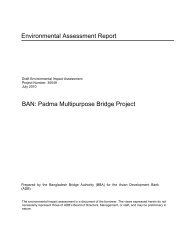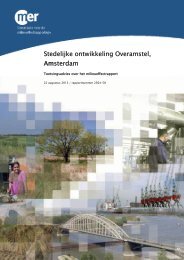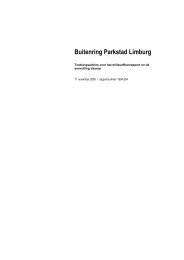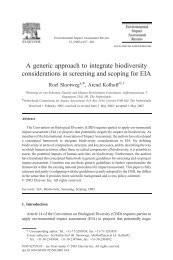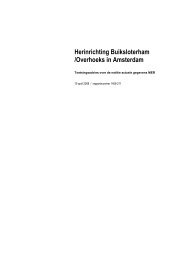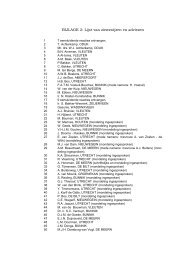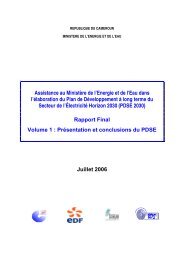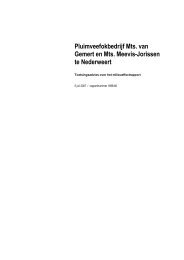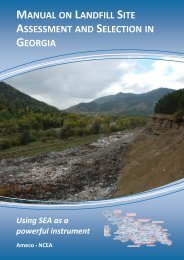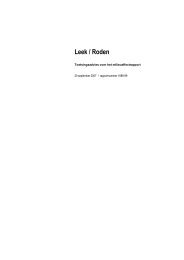Data AssessmentData assessment should assist decision makers in coming to <strong>the</strong> best possible decision taking allaspects (be it economic, social or ecological) into account. In order <strong>for</strong> technicians and engineersto give a good advice <strong>for</strong> <strong>the</strong> decision makers <strong>the</strong>re is usually a need to model <strong>the</strong> water system.The NCEA has also noticed this desire in <strong>Rwanda</strong>. It is also understood that each model is just arepresentation of reality and is <strong>the</strong>re<strong>for</strong>e never 100% realistic. While gaining experience in riverbasin modeling will be helpful during future more advanced <strong>IWRM</strong>, simple calculations within anexcel spreadsheet can often be enough in an early stage of <strong>IWRM</strong>, in order to give sufficient input<strong>for</strong> <strong>the</strong> initial decisions that need to be taken.3. On data assessment, <strong>the</strong> NCEA recommends to:- At regular intervals, identify <strong>the</strong> main in<strong>for</strong>mation needs <strong>for</strong> decision makers (<strong>the</strong> catchmentplan will play an important role in this, see par. 3.3);- Assist <strong>the</strong> RWRD in <strong>the</strong> definition of criteria <strong>for</strong> choosing <strong>the</strong> basic technologies needed togive sufficient advice on <strong>the</strong>se main in<strong>for</strong>mation needs. Take into account simplicity and userfriendliness;- Verify within <strong>the</strong> staffing plan of <strong>the</strong> RWRD whe<strong>the</strong>r related expertise is <strong>for</strong>eseen, such as; GISexpertise or basic modelling skills or specific skills needed <strong>for</strong> <strong>the</strong> MIS operation and/or dataassessment.4. With regard to <strong>the</strong> EKN programme component 1, <strong>the</strong> NCEA advises:- To asses, as a first SEA step, <strong>the</strong> necessity <strong>for</strong> a separate component on MIS development. Ifredundant, <strong>the</strong> EKN could decide to develop a programme with two components ra<strong>the</strong>r thanthree: capacity development and catchment management;- Focus on MIS will not be lost: <strong>the</strong> capacity development component could focus on <strong>the</strong>implementation of <strong>the</strong> presently designed MIS;- Fur<strong>the</strong>r refinement of <strong>the</strong> MIS at catchment level can be linked to <strong>the</strong> catchment managementcomponent, where more detailed in<strong>for</strong>mation is an absolute necessity <strong>for</strong> reliable catchmentplanning.3.2 Component 2: Capacity DevelopmentThe complete component title and description in <strong>the</strong> NCEA’s ToR reads as follows:Component 2: Increased Capacity of <strong>the</strong> Water Resources Department (nation wide). Based on aninstitutional assessment (including a training needs assessment), curricula and training courseswill be developed <strong>for</strong> specific target groups at central and district levels to enhance capacity andknowledge on <strong>IWRM</strong> issues; target groups could come from sectoral ministries, o<strong>the</strong>r governmentorganizations and civil society organizations as long as <strong>the</strong>ir mandate is relevant to aspects ofwater resources management 2121 Description derived from NCEA’s ToR, see Appendix 116
As <strong>for</strong> component 1, <strong>the</strong> NCEA observes that in <strong>the</strong> field of capacity development <strong>for</strong> <strong>IWRM</strong>, asignificant amount of work has been and is being carried out as well:Institutional FrameworkThe institutional framework is being developed in a consistent, step-by-step manner: <strong>the</strong> waterlaw, WRM Policy, WRM Strategy, WRM 5-Year Plan, Master Plan. The documentation as well as <strong>the</strong>interaction at <strong>the</strong> Kigali workshop show that many government organisations, NGO’s, knowledgeinstitutions and private sector are <strong>for</strong>eseen to be involved in <strong>IWRM</strong>. Several questions remain:- How will this institutional framework become operational at both central and decentralisedlevels? The Master Plan will provide an institutional framework derived from <strong>the</strong> Water Law. Itis unclear whe<strong>the</strong>r this framework will be of generic and prescriptive nature or that it willallow <strong>for</strong> differentiation per catchment. The first would be unfavourable <strong>for</strong> effectivecatchment planning, but would allow <strong>for</strong> generic capacity development. The latter would allowaddressing localised problems at <strong>the</strong> appropriate level, but would also need a focussedcapacity development ef<strong>for</strong>t.- How to properly coordinate <strong>the</strong> diversity of organisations and activities involved (<strong>for</strong> example<strong>the</strong> new catchment committees and <strong>the</strong> districts)?- Do all actors know of, understand and fulfil <strong>the</strong>ir legal roles and responsibilities in <strong>IWRM</strong>?<strong>Rwanda</strong> Water Resource DepartmentThe RWRD is mandated to coordinate and implement <strong>IWRM</strong>. The Department is young and onlyrecently staffed. In August 2011, <strong>the</strong> EKN mandated <strong>the</strong> <strong>Rwanda</strong> Water Scan 22 , providing insight ininstitutional and capacity needs <strong>for</strong> <strong>IWRM</strong> in <strong>Rwanda</strong>. This led, among o<strong>the</strong>rs, to <strong>the</strong> decision tofinance a full-time expert on <strong>IWRM</strong> to be deployed at <strong>the</strong> RWRD. This person will be internationallyrecruited and is expected to start early 2013 23 .Since <strong>the</strong> Water Scan, a more in-depth capacity development needs assessment has been carriedout by <strong>the</strong> RIWSP project fairly recently, in April 2012 24 . In addition, October 2012, using <strong>the</strong>capacity needs assessment as a basis, <strong>the</strong> RIWSP project published an organisational review andfive-year staffing plan 25 <strong>for</strong> <strong>the</strong> RWRD. This report explains quite extensively <strong>the</strong> current situationand <strong>the</strong> future expected needs. All in all, <strong>the</strong> NCEA considers <strong>the</strong> current level of needsassessment as generally sufficient <strong>for</strong> <strong>the</strong> time being to start implementing capacity developmentactivities. Several points of attention do come up:- Since <strong>the</strong> capacity needs assessment and staffing plan are already available, <strong>the</strong> consistencywith <strong>the</strong> Master Plan remains to be assessed;- The consequences of both capacity needs assessment and Master Plan at decentral levels willneed to be assessed;22The <strong>Rwanda</strong> Water Scan, August 2011, by Van ‘t Klooster, Smet and Kente on behalf of <strong>the</strong> EKN23 Terms of Reference <strong>for</strong> Consultancy Services: Technical Assistance to <strong>the</strong> Integrated Water Resources Management Sub-Sectorof <strong>Rwanda</strong>, by Clarissa Smulders <strong>for</strong> <strong>the</strong> EKN24Capacity Situation Analysis and Capacity Development Needs Assessment of Integrated Water Resources Management Sub-Sector in <strong>Rwanda</strong> (draft final report), RIWSP/Centre <strong>for</strong> Resources Analysis Limited, April 201225Organisational Review and Five-Year Staffing Plan <strong>for</strong> <strong>the</strong> Integrated Water Resources Management Department of <strong>the</strong> <strong>Rwanda</strong>Natural Resources Authority, RIWSP/Centre <strong>for</strong> Resources Analysis Limited, October 201217



